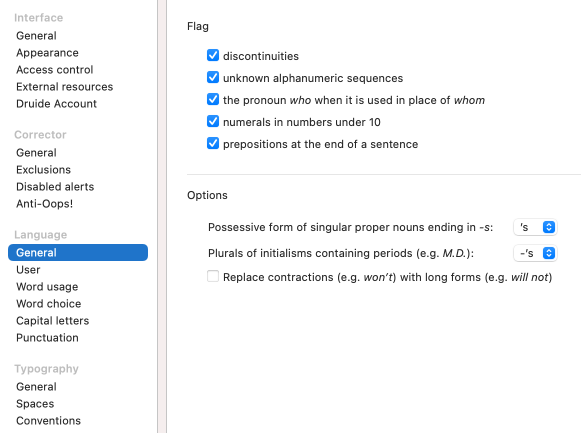General Panel of the Language Settings

Flag
Discontinuities
Occasionally, Antidote encounters unusual sequences in a text that may suggest a problem. This can be a result of missing or superfluous words for which the desired correction is unclear. When this setting is enabled, the corrector draws a dotted line under the affected area and will provide suggestions for reformulating the sentence in a way that resolves the underlying structural issue.
- This setting is enabled by default.
Unknown alphanumeric sequences
An alphanumeric sequence is an unbroken series of letters, numerals and other non-separating symbols (e.g. LOG-6). If you use any such sequences regularly, it may be useful to add them to a personal dictionary so the corrector can better analyze them. Antidote invites you to do this by displaying an unknown word alert when this setting is enabled.
- This setting is disabled by default.
The pronoun who when it is used in place of whom
When this setting is enabled, the corrector favours the pronoun whom (The people whom I hate) over who (The people who I hate) when it refers to the object rather than the subject. This usage may be recommended or even obligatory in some styles, while others consider it formal.
- This setting is enabled by default.
Numerals in numbers under 10
When this setting is enabled, the corrector flags any numbers lower than 10 that are written as numerals (7) rather than words (seven). Typically, these numbers should be written as words provided that the sentence does not contain any other numbers in numeral form.
- This setting is enabled by default.
Prepositions at the end of a sentence
Sentences that end with a preposition (e.g. Which stand did you go to?) are common and widely accepted, although some writers avoid them in very formal contexts. When this setting is enabled, the corrector flags them with an alert.
- This setting is disabled by default.
Options
Possessive form of singular proper nouns ending in -s
Depending on the setting chosen, Antidote will correct the possessive form of singular proper nouns that end in the letter s. You can instruct it to favour the ’s ending (e.g. Charles’s mother), to favour the apostrophe-only ending (e.g. Charles’ mother) or to accept both forms.
- The ’s form is selected by default.
Plurals of initialisms containing periods
Depending on the setting chosen, Antidote will correct the plural form of initialisms that contain periods (e.g. M.D.). You can instruct it to favour the ’s ending (e.g. M.D.’s), the s ending (e.g. M.D.s) or to accept both forms.
- The ’s form is selected by default.
Replace contractions with long forms
When this setting is enabled, the corrector locates the contractions in a text (e.g. won’t), and suggests replacing them with the corresponding long form (e.g. will not). Contractions are considered informal by some style guides.
- This setting is disabled by default.